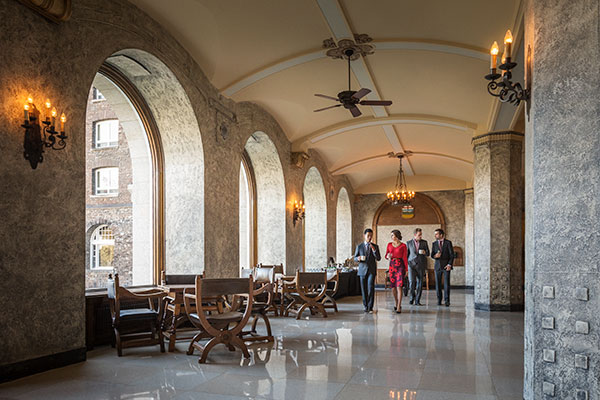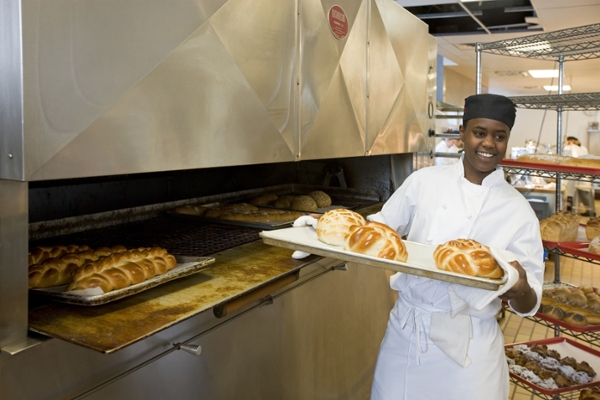On this page:
Overview
Do you love finding exceptional "homes away from home" and guest experiences around the world? You may want to "check-in" to our Hospitality and Tourism Management - Hotels and Accommodation program.
Developed with input from industry experts, this program offers a hands-on, practical education that equips you with real-world knowledge and skills.
The hospitality and lodging industry thrives on communication, problem-solving, and interpersonal skills. You'll learn to adapt to the industry's dynamic nature with enthusiasm and resilience. If you enjoy engaging and collaborating, this career path is perfect.
This program will give you a comprehensive understanding of the hotel industry. You'll learn how hotel departments are interconnected. You'll delve into creating unforgettable guest experiences.
You'll implement your knowledge with two practicum placements alongside renowned hotel partners. These placements will provide you with invaluable practical experience and insights.
You'll also gain expertise in crucial aspects of hotel management, including front office operations, hotel event planning, revenue management, facilities design, and space management. You'll learn the current trends in hotel technology.
Beyond hotels and accommodations, you'll get a strong foundation in the broader hospitality sector. Our small class sizes ensure you get personalized learning. You'll explore guest experience enhancement, sales and marketing strategies, and applied leadership skills. This well-rounded education prepares you for many roles within the industry.
Upon graduation, you can pursue concierge or sales/marketing coordinator roles. Other opportunities include housekeeping manager, reservations agent, supervisor of guest services or room service operations.
With a solid grasp of hotel operations, guest services, revenue management, event and conference planning, and customer relationship management, you'll be primed to excel in a dynamic and customer-focused field.
Those working in the hotels and accommodation industry tend to be objective, directive, methodical and social.
You need:
- a pleasant, energetic and outgoing personality
- excellent communication skills
- organizational skills
- good general health, stamina and mental alertness to cope with the long, irregular hours of work
- the ability to get along with all kinds of people
- leadership and decision-making skills
- the ability to adapt to changing customer needs and unexpected situations
- the ability to remain calm while under pressure.
You should enjoy being in charge, working within clear guidelines, and negotiating with people.
Graduates of this program may continue their education in the SAIT Bachelor of Hospitality and Tourism Management program and earn their degree with a further two years of study.
During your first year, you'll participate in a 120-hour practicum placement with a hotel and accommodation partner.
Between your first and second year, you'll also participate an internship where you'll complete 400 hours of industry work.
The choice of worksite is flexible and can include hotels, restaurants, tour operators, car rental agencies, resorts, and other approved hospitality and tourism operations.
You'll acquire key industry certifications in Workplace Hazardous Materials Information System (WHMIS), food safety, ProServe, and hospitality and tourism awareness.
All these certifications must be completed in your first semester.
After successfully completing this program, you'll receive a SAIT Hospitality and Tourism Management diploma with a specialization in Hotels and Accommodation.
Careers and opportunities
Each year, SAIT conducts a survey between February and April to determine the employment rate, salary and satisfaction of our newest SAIT alumni.
![]() 100% graduate employment rate
100% graduate employment rate
![]() $40,000 average starting salary
$40,000 average starting salary
Find out more about our graduate employment statistics >
Our graduates may work in the following occupations. Some careers require additional experience and education.
Associated National Occupational Classification (NOC) codes: 12103, 60030, 60031, 62022, 64300, 64314, 65210.

Career planning support
Unsure which career path is for you? Here are some recommended career planning resources to help you decide your future.
You can also head to Alberta alis for lots of information about careers in Alberta, including quizzes and labour market information to help you narrow down a path.
Finally, you can take our online career finder quiz, which can help narrow your options based on your current skills and interests.
Courses
The Hospitality and Tourism Management - Hotels and Accommodation diploma requires 63 credits (22 courses) to complete.
The program spans two years, with two semesters in year one and two semesters in year two.
You must take all of the following courses to complete this program.
Hospitality core
| Course | Credits |
|---|---|
|
This course provides an introduction to financial accounting aspects of the hospitality industry. This includes generally accepted accounting principles, financial statement preparation, the accounting cycle, specialized journals, accounting for cash, accounts receivable, sales, payroll and inventories. |
3 |
|
Upon completion of this course, students will have acquired the knowledge and skills to use industry standard tools to perform financial calculations. The financial calculations include simple and compound interest, debt repayment, valuation of investments, simple and general annuities, amortization of debts, sinking funds and bond valuation problems. Students will also learn to analyze, apply, visualize and present the results to inform business planning and decision making related to the hospitality and tourism industry. |
3 |
|
This course examines techniques to communicate and present your ideas using your professional skills as well as a variety of technological solutions. Topics include writing business documents, creating and delivering presentations, preparation for career launch, foundations of effective teamwork, report writing, sourcing and citing information, and interpersonal communication. Concepts are reinforced through relevant, task-based activities and assessments. Equivalents:
|
3 |
|
In this introductory course in Microeconomics, you will learn about economic principles involved in analyzing problems in the business and consumer sectors of the Canadian economy. Some of the topics covered are: economic scarcity, demand, supply, elasticity, and perfect and imperfect competition. Equivalents:
|
3 |
|
This course explores financial strategies and techniques for analyzing business performance and decision-making in the hospitality industry. Topics include budget flexibility, contribution margins, and the strengths and weaknesses of master-budgeting models. Core skills taught in this course include analyzing budget variance, using cost/volume/profit (CVP) relationships to calculate break-even and contribution margins, conducting "what if" analysis and applying hospitality industry cost items, concepts and classifications. These skills will help you become a proactive decision-maker who understands complex financial matters in the hospitality industry. Pre-requisites:
|
3 |
|
This course explores the various sectors of the hospitality and tourism industry, the links between the sectors, and the benefits and impact of the industry on the economy, the environment and employment. Topics include hospitality and tourism careers, health and wellness in the industry, and the hospitality mindset. With consideration to customer satisfaction and pride of place, you will identify areas fundamental to the successful planning and development of a destination. |
3 |
|
This course will prepare you for applied learning environments and the workplace with appropriate certifications. Certifications include Food and Safety Sanitation (FSAN), ProServe liquor service training, Workplace Hazardous Materials Information System (WHMIS) training and White Hat Academy training for employees in Calgary's tourism industry. You will complete these certifications as part the course. |
1.5 |
|
This course provides an overview of Canadian and international laws applicable to the hospitality and tourism industry that will explain your legal and ethical responsibilities in a guest environment. Topics include travellers' rights in Canada and abroad, the basics of Canadian law, contract law, employment law and the legal structure of business, as well as liability and dispute resolution. To help with decision making, you will explore risk assessment tools and the practicalities of negligence for both personal injury and food and beverage service. |
3 |
|
Human Resource (HR) Management includes the foundational knowledge and skills required by HR Professionals and business managers. This course includes an overview of the field of human resource management, along with human resource planning, employee compensation and benefits, recruitment, selection and training of employees, performance management, government regulation and health and safety in the workplace. Equivalents:
|
3 |
|
This course provides you with tools and tests to explore your own personality styles, biases and communication preferences to build deeper cross-cultural understanding and strong team dynamics. Topics include self-awareness, strategies to maintain health and wellness, cross cultural communication and group norm setting. These foundational concepts will support further communication studies. |
3 |
|
Examining leadership styles and staff motivators, you will explore strategies for developing high-performance teams with a service culture mindset for a hospitality business. Topics for this course include leadership, team negotiating, workforce planning and the impact of management practices on motivation, health, and wellness. Pre-requisites:
|
3 |
|
This course will introduce you to key topics in organizational behaviour in the hospitality and tourism industry. These topics include the role of leadership in organizational culture, creating health and wellness culture and managing change and innovation, handling conflict and applying theories of organizational behaviour. These topics will help you understand the important roles that managers play in directing organizational change in response to the realities of power and politics in organizational life. Pre-requisites:
|
3 |
|
This course introduces tourism and hospitality branding, marketing and experience design. Topics include the importance of a service culture, the brand promise and guest experiences. You will explore the impact that a brand can have on guest motivation and experience, and how this can create a competitive advantage in the hospitality and tourism industry. |
3 |
|
This course provides an introduction to marketing and sales principles applied to the tourism and hospitality industry. Topics include tourism distribution channels, the marketing mix, target markets, consumer behaviour and its impact on the customer journey. Pre-requisites:
|
3 |
|
Building on the knowledge and skills you developed previously in this program, this course will teach you how to create and implement a marketing and sales plan that addresses common issues in service and marketing. You will also learn how to prepare a market analysis report, establish market strategies and objectives, develop a marketing program, apply integrated marketing communications and compare methods for evaluating and controlling marketing performance. This knowledge will allow you to recognize new opportunities for attracting guests in competitive and evolving markets. Pre-requisites:
|
3 |
|
This course provides a bridge between academic studies and practical, experiential learning. The choice of worksite is flexible and can include hotels, restaurants, tour operators, car rental agencies, resorts and other approved hospitality and /or tourism operations. Proof of work experience is required for graduation. Pre-requisites:
|
1.5 |
Hotels and Accommodation core
| Course | Credits |
|---|---|
|
This course is an applied lab that will introduce you to various areas of hotel operations in guest relations, operations and food and beverage (F&B). This practicum consists of an orientation, and a rotation practicum working with a SAIT hotel industry partner. With practical experience in each division of the organization, you will learn how each department in hotel management impacts overall operations. Pre-requisites:
|
3 |
|
In this capstone course, students from the hotel and accommodation specialization work collaboratively to apply classroom knowledge, previous practical hotel experience, and diverse viewpoints to a challenge faced by a hotel organization. Combining their disciplinary perspectives for broader context, students will investigate and analyze a hotel-related problem before presenting a solution. A hotel orientation is included in this course. Pre-requisites:
|
3 |
|
This course considers the impact of events on hotel revenue and operations. Topics include the relationship between events and hotel revenue, the importance of a banquet event order, the role of hotel staff in event execution, health and safety, risk management and the guest experience. |
3 |
|
This course examines hotel revenue management practices, with a focus on maximizing revenue and understanding all costs associated with revenue. Topics include the impact of pricing on consumer behavior, inventory management in the hospitality industry, and strategies to maximize revenue and reporting. Pre-requisites:
|
3 |
|
All aspects of the hotel's Front Desk are presented from the perspective of both individuals and groups, including reservations, check-in, billing, and check-out. Plus, the elements of guest history and travel trade management. Emphasis is placed on practical hands-on exercises using a Property Management System. Pre-requisites:
|
3 |
|
In this course you will use an integrated learning approach to create facility maintenance strategies. This approach will teach you how to optimize these strategies to help organizations achieve their long-term goals for facility maintenance. You will learn about the importance of risk management, budgeting, sustainability, safety and security and other management concerns in the hospitality industry. You will also learn how to use selection, procurement and sustainability best practices when designing a facilities management plan. |
3 |
Progression
You must attain a PGPA and/or a CGPA of 2.0 or better each semester and pass the prerequisite courses to progress through the program.
To qualify for graduation, you must pass all courses, attain a CGPA of 2.0 or better and complete course requirements within the prescribed timelines.
Review our grading and progression procedure >

Explore your options!
Some courses in this program are available through Open Studies. You can complete courses via Open Studies to get a head start on your education, reduce your course load once accepted into a credentialed program, or determine which career path best suits you before you fully commit.
You may also take courses for general interest or personal and professional development.
Admission requirements
Applicants educated in Canada
Applicants must demonstrate English language proficiency and completion of the following courses or equivalents:
- at least 50% in Math 30-1, Math 30-2 or Pure Math 30 or 60% in Applied Math 30, and
- at least 50% in English Language Arts 30-1 or 60% in English Language Arts 30-2.
SAIT accepts high school course equivalents for admission for applicants educated outside Alberta.
All applicants who were educated outside of Canada must demonstrate English language proficiency and provide proof they meet the program admission requirements outlined above with an international document assessment. Find accepted educational documents and assessment options.
SAIT may also accept courses completed at certain international post-secondary institutions.

Academic Upgrading
Missing an admission requirement for this program? Upgrade your prior education to help you receive admission into one of SAIT's career programs.

English language proficiency
All applicants must demonstrate English language proficiency prior to admission, including students educated in Canada.
Transfer agreements
At SAIT, we have created transfer agreements with partner institutions to allow you to earn course credits toward your SAIT program based on your previously completed credentials.
Transfer Alberta search tool
Use the Transfer Alberta search tool to see all transfer agreements between Alberta post-secondary institutions (including those with the University of Calgary, Mount Royal University and Bow Valley College.)
Search transfer agreements in Alberta
There are no formal transfer agreements currently in place for this program.
Transfer options for graduates
When you have completed this program, you may continue your education at a partner post-secondary institution. These transfer agreements include partnerships within and/or outside of Canada.
Credits this program transfers to
- Available credits:
- n/a
Graduates of this program are eligible to apply for the Bachelor of Commerce (BCom) degree at the University of Victoria.
Applicants will be evaluated for admission into the BCom program based on:
- their final GPA from the Hospitality and Tourism Management program (60% as determined by the University of Victoria)
- a qualitative assessment (40% as outlined in the university calendar and the Gustavson School of Business.)
A minimum GPA of B or 73%, as calculated by the University of Victoria, is required.
The following courses are also entry requirements. You should complete these courses within or alongside the SAIT Hospitality and Tourism Management diploma program.
| Required course | SAIT equivalent |
|---|---|
| ECON 103 | ECON 250 |
| MATH 151 | BMAT 201 |
| STAT 252 | STAT 270 (or other equivalent) |
You must also complete a course satisfying the academic writing requirement, equivalent to English AWR 100 level. ENGL 1101 or CMNS 1811 are suggested acceptable options offered through Thompson Rivers University Open Learning.
If you receive an offer of admission to the BCom program, you will need to complete COM 200, a condensed online summer class through the University of Victoria, prior to beginning the degree.
The required courses must have a combined average of a B- (70%) with no grades below a C+ (65%).
These courses must be completed by August 31 of the year you intend to start at the University of Victoria.
- Available credits:
- 45
Upon successful completion of this program, you'll be eligible to receive up to 45 credits (1.5 years) toward Griffith's Bachelor of International Tourism and Hotel Management program.
This degree is a three-year program with intakes offered in February and July each year.
- Available credits:
- 60
- Available credits:
- 60
Upon successful completion of your diploma program with a minimum B grade (3.0 GPA) and by meeting all other admission criteria, you will be eligible to transfer into the third year of the Bachelor of Commerce in Entrepreneurial Management at Royal Roads University.
Available intakes
Spring 2025
Start dates:
- Domestic students: Open
-
-
Application deadline: April 30, 2025
-
Fall 2025
Start dates:
- Domestic students: Open
-
-
Application deadline: June 30, 2025
-
- International students: Open
-
-
Application deadline: May 30, 2025
-
Winter 2026
Start dates:
- Domestic students: Open
-
-
Application deadline: Oct. 24, 2025
-
- International students: Open
-
-
Application deadline: Sept. 26, 2025
-
Spring 2026
Start dates:
- Domestic students: Open
-
-
Application deadline: April 30, 2026
-
- International students: Open
-
-
Application deadline: March 27, 2026
-
Costs
2025/26 tuition and fees
The following costs are effective as of July 1, 2025.
The estimated total cost of tuition and fees is based on the suggested schedule of study. Following a modified schedule will impact the fees you pay per semester and may alter final costs.
Domestic students
The program total is based on the estimated amount you will pay if you enter this program during the 2025/26 academic year. The program total amount listed on your letter of admission may appear higher. This amount is your maximum tuition guarantee for the program. SAIT will not exceed this maximum, regardless of changes in tuition and fees between academic years.
Books and supplies are approximately $1,000 - $1,500 per full-time year.
This is a bring-your-own-device program with a standard computer hardware and software requirement. See the specific requirements on our computers and laptops page.
Find your booklist on the SAIT Bookstore's website. The booklist will be available closer to the program start date.
Can't find your program or course? The bookstore didn't receive a textbook list. Contact your program directly to determine if they're still refining course details or if you're in luck; no textbook purchase is required this term.

Financial aid
Paying for your education may feel overwhelming, but we have resources and programs that can help, including information about payment options, student loans, grants and scholarships.
Application process
When applying in the application portal, select Hospitality and Tourism Management. You will be able to select Hotels and Accommodation as your major during the application process.

Begin your application
Apply now using the online application portal.
Ensure you have a valid Visa or Mastercard to pay the non-refundable application fee of $120 for domestic applicants or $175 for international applicants.
Ready to apply?
Follow our step-by-step guide to submitting a successful application.
Communication during admission
Email is the primary source of communication during the selection process. Ensure your personal email account is managed appropriately to receive our emails, files and communications. We recommend you add the hospitality@sait.ca domain to your safe senders' list or you risk missing critical email messages.
Information sessions
Prepare for a strong start in your chosen program or get the details you need to decide your future path.
Our expert staff and faculty are ready to answer your questions and provide information about the following:
- What sets SAIT apart
- An introduction to the program and area of study
- Admission requirements
- Future career paths
- Information on the earning potential and graduate employment rates.
Contact us
School of Hospitality and Tourism Advising
-
Phone - 403.284.8612
-
Email - hospitality.info@sait.ca
International Student Advising
-
Phone - 403.284.8852
-
Email - international@sait.ca
Subscribe for updates
Your journey starts here! Sign up to get important updates on:
- Food and hospitality programs
- Application information
- Relevant news and events

Oki, Âba wathtech, Danit'ada, Tawnshi, Hello.
SAIT is located on the traditional territories of the Niitsitapi (Blackfoot) and the people of Treaty 7 which includes the Siksika, the Piikani, the Kainai, the Tsuut’ina and the Îyârhe Nakoda of Bearspaw, Chiniki and Goodstoney.
We are situated in an area the Blackfoot tribes traditionally called Moh’kinsstis, where the Bow River meets the Elbow River. We now call it the city of Calgary, which is also home to the Métis Nation of Alberta.




